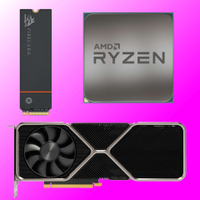AMD Ryzen 9 7000X3D CPUs to launch later this month, cheaper chip to follow
Arriving February 28. Mostly.
AMD has finally announced the availability date and pricing for its upcoming Ryzen 7000-series processors with 3D V-Cache stacking technology. You can expect the two Ryzen 9 chips imbued with heaps of cache later this month, February 28, but you'll have to wait until April 6 for the cheaper Ryzen 7.
| Model | Cores/threads | Boost/base frequency (GHz) | Cache | TDP (Watt) | MSRP | Release date |
|---|---|---|---|---|---|---|
| Ryzen 9 7950X3D | 16/32 | 5.7/4.2 | 144MB | 120 | $699 | February 28 |
| Ryzen 9 7900X3D | 12/24 | 5.6/4.4 | 140MB | 120 | $599 | February 28 |
| Ryzen 7 7800X3D | 8/16 | 5.0/4.2 | 104MB | 120 | $449 | April 6 |
The top chip, the Ryzen 9 7950X3D, is priced the same as the Ryzen 9 7950X was at launch, at $699. However, that non-3D chip has dropped in price significantly over the past few months. It's around ~$600 today.
Both the Ryzen 9 7900X3D and Ryzen 7 7800X3D launch for $50 more than what their non-stacked counterparts arrived for last year. Considering the expected increase in gaming performance, I could see why that sort of price premium might be appealing to many. But, again, you can find both the Ryzen 9 7900X and Ryzen 7 7700X going for a lot less nowadays.
Any decision between the non-3D and 3D chips is complicated by the fact that it's possible to buy the 12-core/24-thread Ryzen 9 7900X for $444, pretty much the same price AMD is asking for the Ryzen 7 7800X3D, an eight-core/16-thread chip. Of course, the difference here is in all that cache that the Ryzen 7 7800X3D stores under its heat spreader. That cache works a treat in bolstering game performance.
Ultimately, you decide: higher multithreaded performance or better gaming performance?
3D V-Cache is a technology that AMD has used only sparingly in the past, namely with the Ryzen 7 5800X3D for us gamers. The technology essentially allows AMD to layer masses of cache on top of the chiplets that make up its Ryzen CPUs. In turn, this means the CPU can store more information within easy reach of the processing cores of the chip, thus improving performance in cache-dependent workloads.
One such cache-dependant workload is gaming, which tends to benefit massively from having plenty of cache nearby.
Keep up to date with the most important stories and the best deals, as picked by the PC Gamer team.
These chips should be pretty feisty when it comes to gaming performance, not only versus the Ryzen 7000-series processors available today but also Intel's Raptor Lake chips. We'll have to see how these chips perform to say for sure what's best, but I do expect some serious gaming performance on offer from these new stacked chips.
Best CPU for gaming: Top chips from Intel and AMD
Best gaming motherboard: The right boards
Best graphics card: Your perfect pixel-pusher awaits Best SSD for gaming: Get into the game first

Jacob earned his first byline writing for his own tech blog. From there, he graduated to professionally breaking things as hardware writer at PCGamesN, and would go on to run the team as hardware editor. He joined PC Gamer's top staff as senior hardware editor before becoming managing editor of the hardware team, and you'll now find him reporting on the latest developments in the technology and gaming industries and testing the newest PC components.


